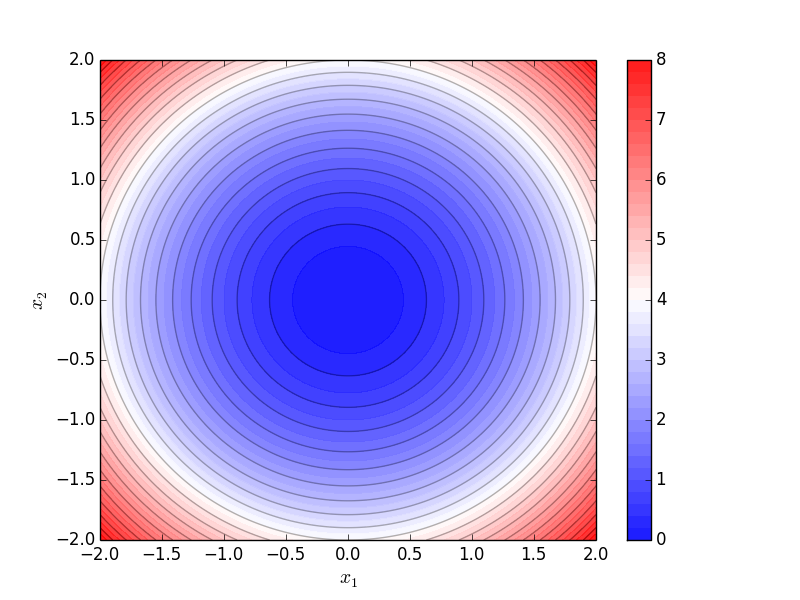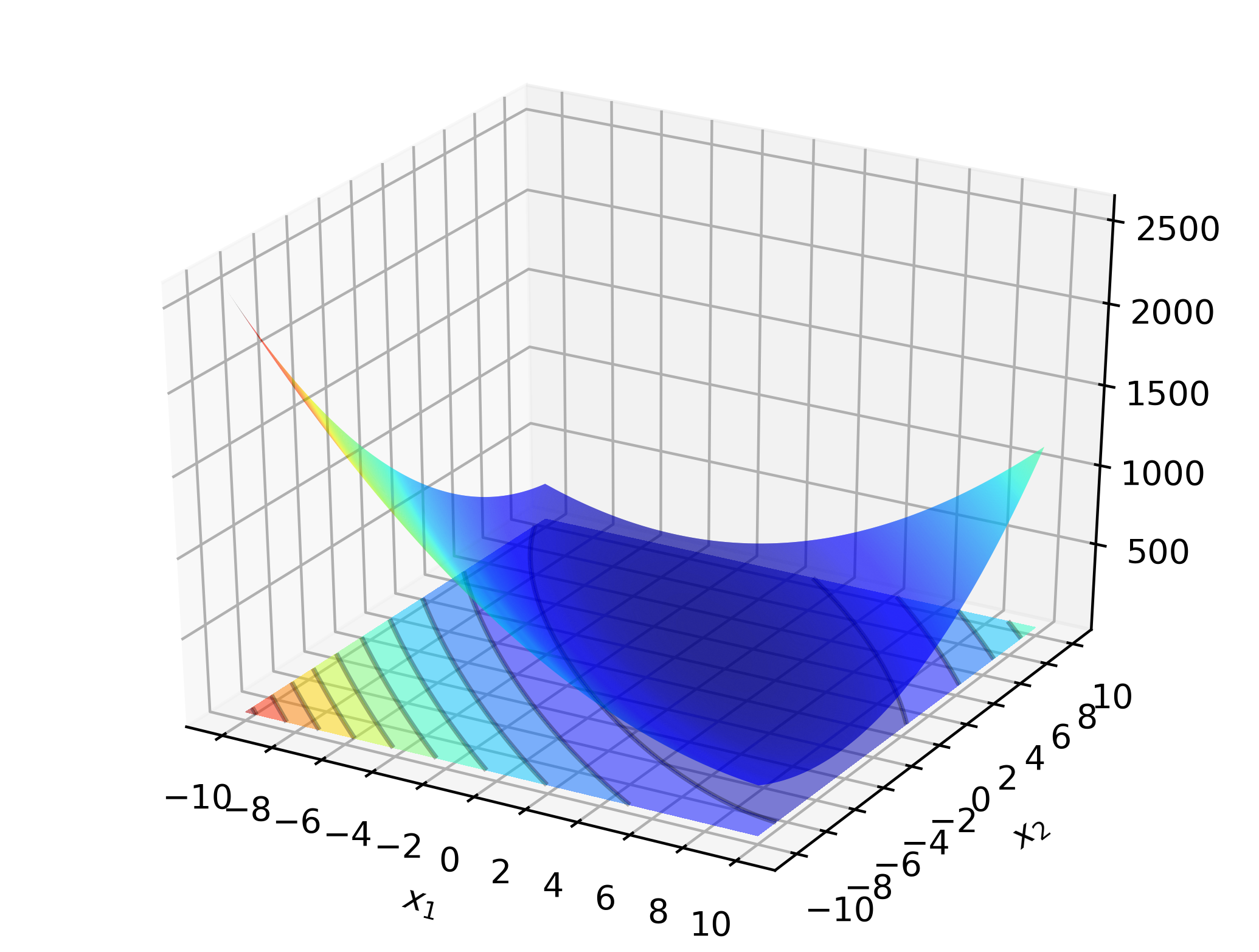The limited memeory BFGS (L-BFGS) algorithm is a quasi-Newton method for convex optimization.
Definition and Syntax
bool lbfgs(arma::vec& init_out_vals, std::function<double (const arma::vec& vals_inp, arma::vec* grad_out, void* opt_data)> opt_objfn, void* opt_data); bool lbfgs(arma::vec& init_out_vals, std::function<double (const arma::vec& vals_inp, arma::vec* grad_out, void* opt_data)> opt_objfn, void* opt_data, algo_settings_t& settings);
Function arguments:
init_out_valsa column vector of initial values; will be replaced by the solution values.opt_objfnthe function to be minimized, taking three arguments:vals_inpa vector of inputs;grad_outa vector to store the gradient; andopt_dataadditional parameters passed to the function.
opt_dataadditional parameters passed to the function.value_outthe value ofopt_objfnwhen evaulated at the output values.settingsparameters controlling the optimization routine; see below.
Optimization control parameters:
double err_tolthe tolerance value controlling how small $\| \nabla f \|$ should be before 'convergence' is declared.int iter_maxthe maximum number of iterations/updates before the algorithm exits.bool vals_boundwhether the search space is bounded. If true, thenarma::vec lower_boundsthis defines the lower bounds.arma::vec upper_boundsthis defines the upper bounds.int lbfgs_par_Mstorage parameter.
Details
Let $x^{(i)}$ denote the function input values at stage $i$ of the algorithm. The L-BFGS updating rule is as follows.
- The descent direction $d^{(i)}$ is found via a two-loop recursion. Let
\begin{align*}
s^{(i)} &:= x^{(i+1)} - x^{(i)} \\
y^{(i)} &:= \nabla f^{(i+1)} - \nabla f^{(i)}
\end{align*}
where $\nabla f^{(i)}$ is the gradient of $f$ evaluated at $x^{(i)}$.
Then:- Set $$q = \nabla f(x^{(i)})$$
- for $k = i - 1, \ldots, i - M$ do
\begin{align*}
\rho_k &= 1 / ( y^{(k)}{'} s^{(k)}) \\
\gamma_k &= \rho_k \times s^{(k)}{'} q \\
q &= q - \gamma_k \times y^{(k)}
\end{align*}
where the history length $M$ is set via
lbfgs_par_M. - Set $r = q \times (s^{(i)}{'}y^{(i)} / y^{(i)}{'}y^{(i)})$
- for $k = i - M, \ldots, i - 1$ do $$\beta = \rho_k y^{(k)}{'} r$$ $$r = r + s^{(k)}(\gamma_k - \beta)$$
- Finally, set $d^{(i)} = - r$.
- The input values are then updated: $$x^{(i+1)} = x^{(i)} + \alpha^{(i)} d^{(i)}$$ where $\alpha^{(i)}$ is found via line search: $$\alpha^{(i)} = \arg \min_\alpha f(x^{(i)} + \alpha d^{(i)})$$ The line search method used in OptimLib is that of More and Thuente (1994).
The algorithm stops when $\| \nabla f \|$ is less than err_tol, or the total number of iterations exceeds iter_max.
Examples
As examples, consider minimization of:
- the Sphere function $$\min_{x \in \mathbb{R}^n} \sum_{i=1}^n x_i^2$$ The solution is the zero vector
- Booth's function $$\min_{x \in [-10,10]^2} \left\{ (x_1 + 2x_2 - 7)^2 + (2 x_1 + x_2 - 5)^2 \right\}$$ The global minimum is located at $(1,3)$.
Below are plots of each example, restricted to the two-dimensional problem where relevant.
Sphere

Booth

Code solving each example using OptimLib is given below.
#include "optim.hpp"
double sphere_fn(const arma::vec& vals_inp, arma::vec* grad_out, void* opt_data)
{
double obj_val = arma::dot(vals_inp,vals_inp);
//
if (grad_out) {
*grad_out = 2.0*vals_inp;
}
//
return obj_val;
}
double booth_fn(const arma::vec& vals_inp, arma::vec* grad_out, void* opt_data)
{
double x_1 = vals_inp(0);
double x_2 = vals_inp(1);
double obj_val = std::pow(x_1 + 2*x_2 - 7.0,2) + std::pow(2*x_1 + x_2 - 5.0,2);
//
if (grad_out) {
(*grad_out)(0) = 2*(x_1 + 2*x_2 - 7.0) + 2*(2*x_1 + x_2 - 5.0)*2;
(*grad_out)(1) = 2*(x_1 + 2*x_2 - 7.0)*2 + 2*(2*x_1 + x_2 - 5.0);
}
//
return obj_val;
}
int main()
{
//
// sphere function
const int test_dim = 5;
arma::vec x = arma::ones(test_dim,1); // initial values (1,1,...,1)
bool success = optim::lbfgs(x,sphere_fn,nullptr);
if (success) {
std::cout << "lbfgs: sphere test completed successfully." << std::endl;
} else {
std::cout << "lbfgs: sphere test completed unsuccessfully." << std::endl;
}
arma::cout << "lbfgs: solution to sphere test:\n" << x << arma::endl;
//
// Booth function
arma::vec x_2 = arma::zeros(2,1); // initial values (0,0)
bool success_2 = optim::lbfgs(x,booth_fn,nullptr);
if (success_2) {
std::cout << "lbfgs: Booth test completed successfully." << std::endl;
} else {
std::cout << "lbfgs: Booth test completed unsuccessfully." << std::endl;
}
arma::cout << "lbfgs: solution to Booth test:\n" << x_2 << arma::endl;
return 0;
}